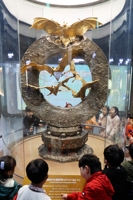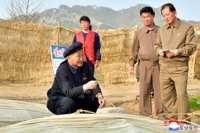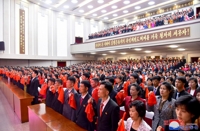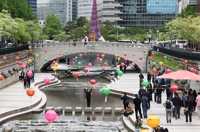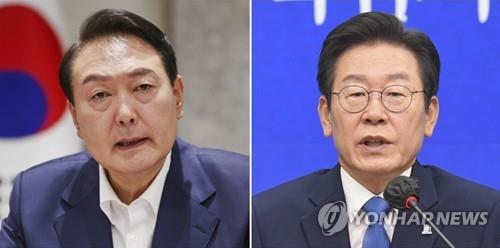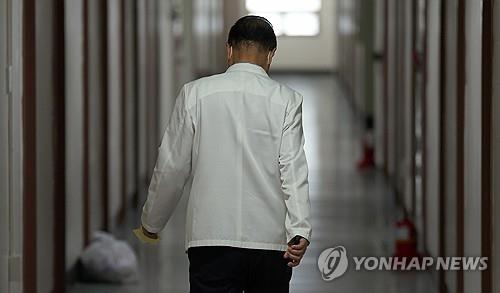North Korea Newsletter 343 (Dec. 18 2014)
FOREIGN TIPS
U.S. Congress passes legislation requiring report on N.K. political prison camps
WASHINGTON(Yonhap) -- The U.S. Congress has passed legislation that requires the government to submit a report on North Korea's political prison camps amid mounting international pressure on Pyongyang over its human rights violations, sources said on Dec. 12.
The bill, H.R.4681, passed through the House of Representatives and the Senate on Tuesday and Wednesday, respectively, the sources said. It was believed to be the first time that Congress has requested a report on the North's prison camps.
The move came as international pressure has been mounting on North Korea to improve its human rights record, with a U.N. General Assembly committee passing a landmark resolution last month that calls for referring the issue to the International Criminal Court.
When the bill was first initiated in the House by Mike Rogers (R-MI), it did not require reporting on the North's prison camps. But the section was included in the Senate version of the bill submitted by Dianne Feinstein (D-CA) and was later added to the final legislation, the sources said.
The legislation calls for the government to submit a report on the North's prison camps to the intelligence committees of the House and the Senate, and to the Senate Foreign Relations Committee and the House Foreign Affairs Committee.
The report should describe the actions the United States is taking to support implementation of the recommendations of the U.N. Commission of Inquiry on the North's human rights, including the eventual establishment of a tribunal to hold individuals accountable for abuses, the legislation said.
It should also include the estimated prisoner population of each such camp, its geographical coordinates, the reasons for confining the prisoners at each camp, a description of the primary industries and products made at each such camp, and the end users of any goods produced at each camp.
The legislation also calls for information identifying individuals and agencies responsible for conditions in each political prison camp at all levels of the North's government, a description of the conditions under which prisoners are confined, with respect to the adequacy of food, shelter, medical care, working conditions, reports of ill-treatment of prisoners, and unclassified imagery, including satellite imagery, of each such camp.
North Korea has long been labeled as one of the worst human rights violators in the world. The communist regime does not tolerate dissent, holds hundreds of thousands of people in political prison camps and keeps tight control over outside information.
But Pyongyang has bristled at such criticism, calling it a U.S.-led attempt to topple its regime.
-------------------------
N. Korea seen to lift Ebola travel ban in Q1 of next year
BEIJING (Yonhap) -- North Korea is expected to lift an Ebola-related entry ban on foreign tourists sometime during the first quarter of 2015, according to a Beijing-based tour agency on Dec. 11.
North Korea began barring foreign tourists from entering the country in late October and has required all foreigners visiting the North to be put under quarantine for 21 days as a precaution against the spread of Ebola.
"The latest information we currently have from our contacts is that the temporary suspension of tours to North Korea -- enacted by the DPRK (North Korea) government on 25 October 2014 in response to the outbreak of Ebola in West Africa -- will be lifted at some point during Q1 of 2015," the British-run Koryo Tours said in an announcement on its website.
"While the exact date is yet to be confirmed at this stage we are confident that tours will resume during this period and will be sure to post more detailed news here as soon as we have further updates," said the agency specializing in travels to North Korea.
Koryo Tours also said it has been told by a North Korean sports official that the country will invite foreign tourists to an annual marathon to celebrate its founder's birthday, the 2015 Pyongyang Marathon set for April 12.
"A North Korean official at the DPRK's Ministry of Sport has since confirmed with us that the Pyongyang Marathon on 12 April 2015 will be open to international tourists," it said.
North Korea closed its borders for several months in 2003 because of the spread of the SARS virus.
Since the outbreak of Ebola in West Africa this year, nearly 6,400 people have died from the virus, most of them in Liberia, Sierra Leone and Guinea, according to the latest figures by the World Health Organization.
-------------------------
N.K. shows no signs of preparations for nuclear test: think tank
WASHINGTON (Yonhap) -- North Korea is showing no signs of preparing to conduct a nuclear test, despite its threat to do so in anger over a U.N. General Assembly resolution on its human rights violations, a U.S. think tank said on Dec. 10.
The website 38 North made the assessment, saying commercial satellite imagery shows that there has been "low-level activity" at the North's Punggye-ri underground nuclear test site for the past four months.
"It is unlikely that North Korea will conduct a nuclear test in the next two to three months," 38 North said in a report.
The North has so far conducted three nuclear tests at the site in 2006, 2009 and 2013.
Speculation mounted early this year that the North could conduct a nuclear test after the regime threatened to conduct a "new form of nuclear test." But the regime did not go ahead with a test.
In November, Pyongyang again threatened to test a nuclear device after the Third Committee of the U.N. General Assembly passed a resolution that called for referring the North to the International Criminal Court for human rights violations.
-------------------------
Young N.K. defectors share ordeals at State Department
WASHINGTON (Yonhap) -- Two young North Korean defectors spoke of tragic ordeals they went through before and after fleeing the communist nation on Dec. 10as the State Department hosted a special Human Rights Day event to promote awareness of how much Pyongyong mistreats its own people.
The event marked the first time that the department has invited North Korean defectors to speak on International Human Rights Day. U.S. officials attending the event included Amb. Robert King, special envoy for North Korean Human Rights Issues, and Assistant Secretary of State for Democracy, Human Rights and Labor Tom Malinowski.
It was part of U.S. efforts to continue to ratchet up pressure on Pyongyang to improve its human rights record after a U.N. General Assembly committee passed a landmark resolution in November that calls for referring the issue to the International Criminal Court.
"North Korea has one of the worst human rights records of any nation on the Earth," King said, adding that the communist nation stood at rock bottom in a recent assessment by the Economist of the human rights records of 167 nations in the world.
The young defectors, Joseph Kim and Yeonmi Park, shared powerful stories with the audience.
Park, 21, first talked about how she grew up in a North Korean city near the China border, where she witnessed the public execution of the mother of one of her friends for selling foreign DVDs. After her father was punished for doing unauthorized trade with China, Park said she and her mother fled to China.
Silence descended in the State Department's Dean Acheson Auditorium as Park spoke of one of her first experiences in China: A broker demanding sex with Park, then only 13, with a threat to send them back to the North, and her mother offering to be raped instead to protect her daughter.
Park ultimately came to South Korea via Mongolia. She is now a college student.
"They are being treated like animals. No one deserves to be treated this way," Park said of North Korean refugees hiding in China.
Kim, 24, talked about how his poor family struggled with hunger in his hometown, also near China, saying he often left home at 5 a.m. in search of firewood and came back at midnight and how he spent his birthday without having any food.
"Hunger is humiliation and hunger is hopeless," he said. "This famine was created by government policies. I know South Korea did not have a famine like this even though they have similar climate and geographies. It's really to think about how many people have suffered and starved to death."
Kim said he lost his father to starvation. His death left the family in an even more difficult situation and his mother and elder sister left for China in search of food. A few months later, his mother was arrested in China and repatriated but only after his sister was sold to a man in China, he said.
Failure to say goodbye properly to his sister when she left for China remains "one of my biggest regrets in my life," he said.
Kim later fled to China and came ultimately to the United States. He's now a college student in New York.
"I'm eternally grateful to the U.S. government" for allowing defectors like him not only to resettle, but also to have an experience of a "true meaning of freedom."
"To me, freedom means being able to imagine who I want to be and actually having a chance to make it possible," he said.
Assistant Secretary Malinowski said that the United States will keep up pressure on the North to improve its human rights record and the issue will "stay on the agenda of the U.N. Security Council permanently until no longer it needs to be there."
Malinowski said the State Department will disclose all information it has about the North's human rights violations, such as political prison camps, on a government website at www.HumanRights.gov.
"One day, the North Korean people will be free. That is inevitable," he said. "The Korean Peninsula will be whole and our goal is to try to do whatever we can to accelerate that progress."
(END)
-
 'Queen of Tears' weaves rich tapestry of Korean contemporary art
'Queen of Tears' weaves rich tapestry of Korean contemporary art -
 Ateez member Yunho throws first pitch at MLB match between Dodgers, Mets
Ateez member Yunho throws first pitch at MLB match between Dodgers, Mets -
 N. Korea says Kim guided simulated nuclear counterattack drills for 1st time
N. Korea says Kim guided simulated nuclear counterattack drills for 1st time -
 N. Korea calls envisioned U.S. aid to Ukraine 'hallucinogen'
N. Korea calls envisioned U.S. aid to Ukraine 'hallucinogen' -
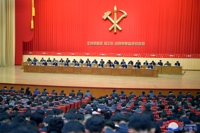 N. Korea calls on party propaganda officials to work harder
N. Korea calls on party propaganda officials to work harder
-
 'Queen of Tears' weaves rich tapestry of Korean contemporary art
'Queen of Tears' weaves rich tapestry of Korean contemporary art -
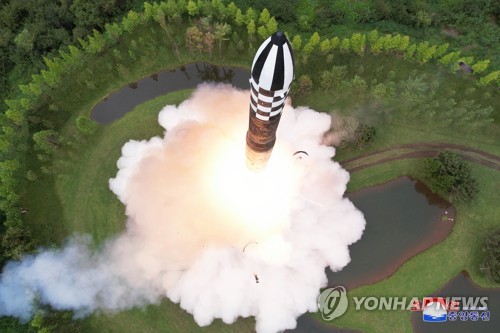 Experts see possibility of N.K. conducting nuclear test before U.S. presidential vote
Experts see possibility of N.K. conducting nuclear test before U.S. presidential vote -
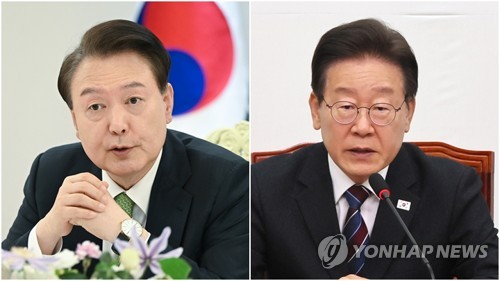 Details of meeting between Yoon, opposition leader undecided: presidential office
Details of meeting between Yoon, opposition leader undecided: presidential office -
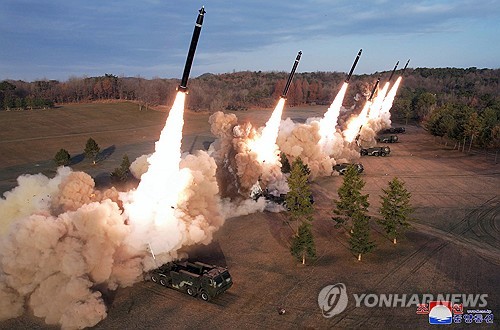 N. Korea says Kim guided simulated nuclear counterattack drills for 1st time
N. Korea says Kim guided simulated nuclear counterattack drills for 1st time -
 Looming weekly closure of major hospitals feared to worsen medical service crisis
Looming weekly closure of major hospitals feared to worsen medical service crisis
-
 S. Korea eliminated in Olympic football qualifiers as poor defense, undisciplined play prove costly
S. Korea eliminated in Olympic football qualifiers as poor defense, undisciplined play prove costly -
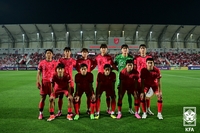 10-man S. Korea lose to Indonesia to miss out on Paris Olympic football qualification
10-man S. Korea lose to Indonesia to miss out on Paris Olympic football qualification -
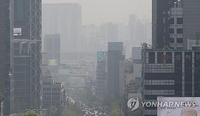 S. Korea reports highest suicide rate, ultra fine dust level among OECD nations: data
S. Korea reports highest suicide rate, ultra fine dust level among OECD nations: data -
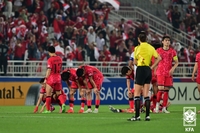 (LEAD) 10-man S. Korea lose to Indonesia to miss out on Paris Olympic football qualification
(LEAD) 10-man S. Korea lose to Indonesia to miss out on Paris Olympic football qualification -
 (3rd LD) Hybe to file complaint against sublabel executives over internal conflict
(3rd LD) Hybe to file complaint against sublabel executives over internal conflict















